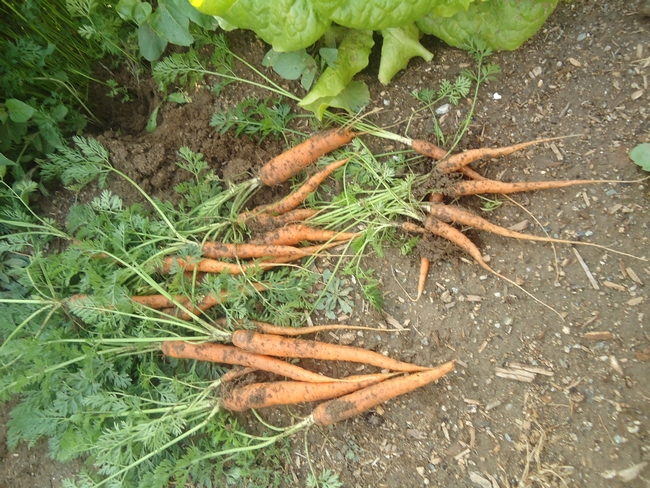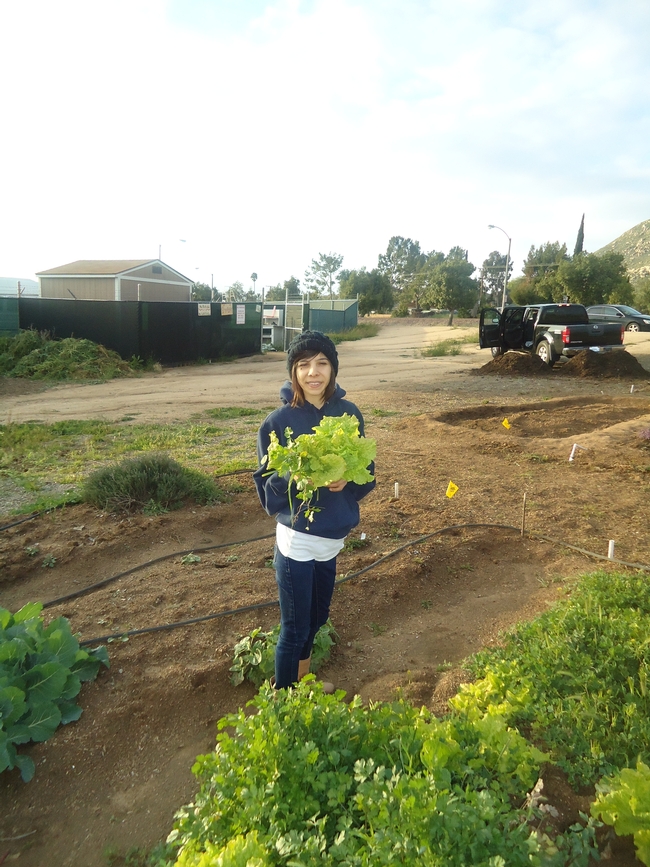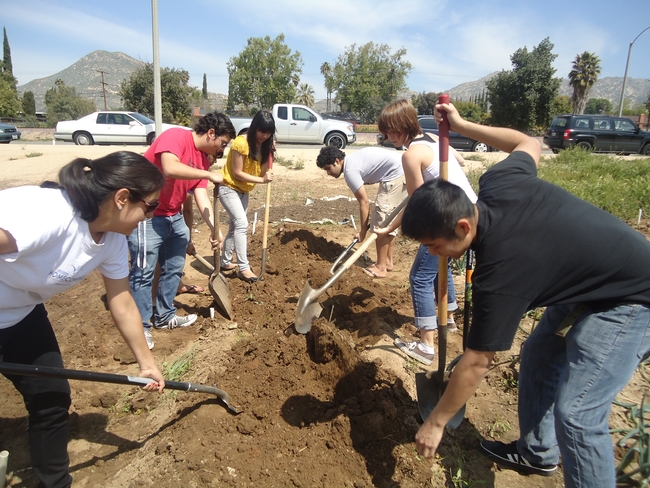Posts Tagged: community gardens
UC Cooperative Extension takes community gardening to a new level in Riverside
UC Cooperative Extension in Riverside County is bringing together students, agencies, nutrition educators and gardening experts to work alongside families to grow produce in garden plots at a community facility.
“Many people don't know how to get started gardening,” said Chutima Ganthavorn, the nutrition, family and consumer sciences advisor for UCCE and manager of its local UC CalFresh Nutrition Education Program. “Gardening takes space, water, resources like seeds and transplants, plus guidance and support. Our group is going the extra mile in Riverside County to help people grow and eat healthy food.”
This year, the local coalition received $10,000 in support from the Kaiser Permanente Heal Zone project to expand a vegetable garden at the Community Settlement Association (CSA), a center where community members gather for UC CalFresh nutrition classes, weekly food distributions and other services.
“A few years ago, the garden plots at the Community Settlement Association were neglected and weedy, while families struggled to get healthy food,” Ganthavorn said. “UC CalFresh teamed up with UCCE Master Gardeners and CSA staff to turn them into bountiful and beautiful edible gardens. Now our coalition is growing to include UCR Community Garden and Heal Zone members, including folks from City of Riverside Parks and Rec and Riverside Community Health Foundation.”
In 2014, UC Master Gardener volunteers, nutrition educators and members of the community planted vegetables in five existing garden boxes at Community Settlement Association, 4366 Bermuda Ave. in Riverside.
For planting day, neighborhood families – many who had taken part in UC CalFresh nutrition classes at the CSA – tilled the ground and planted seeds and transplants to grow tomatoes, bell peppers, summer squash, lettuce, green beans and Swiss chard.
“We're fixing up a garden for the children,” said Gonzalo Rodriguez, who joined planting day with his family. “We're planting chili and tomato transplants and seeds, food that will provide vegetables and give the children the joy of caring for the plants.”
In 2015, UC CalFresh arranged a $500 grant from Wood Streets Green Team, a local group that promotes sustainable living, to purchase fruit trees. Master Gardeners led volunteers to plant blackberry bushes, and peach, pluot, nectarine, plum, fuji apple and mini mandarin trees. They also planted quince, pomegranate, lemon and lime trees donated by a Master Gardener.
With the Heal Zone funds and support from UC Riverside student Claudia Villegas, the recipient of a Global Food Initiative Fellowship from the UC Office of the President, an extended garden began to take shape.
Villegas recruited students from Sigma Alpha Epsilon and Phi Chi Theta fraternities to transform a lawn at the community center with cinderblock raised beds. She is coordinating training sessions and encouraging local families to visit.
“I want the community to feel comfortable coming to the garden,” said Villegas, a senior psychology major. “I want them to just come in and hang out and interact and talk about gardening problems.”
The raised-bed plots have been assigned to families in the community.
“They feel ownership and maintain the gardens,” Ganthavorn said. “They can keep the produce they grow, and any extra produce goes to the weekly food distribution program at CSA.”
A gardening club now meets from 9 to 10 a.m. the first Thursday of each month at the community garden. UC Cooperative Extension coordinates gardening workshops with UC Master Gardener volunteers and nutrition and cooking sessions with UC CalFresh educators.
A 4-H club for children in the community is also being developed at the CSA site by Claudia Diaz Carrasco, UCCE 4-H Youth Development advisor. The purpose of 4-H clubs is to help diverse young people discover and develop their potential and grow into competent, contributing, and caring citizens.
“We believe that CSA children will benefit a lot by participating in 4-H learn-by-doing activities within the club,” Diaz said. 4-H clubs usually meet in the evenings or on weekends and offer self-chosen multiple learning experiences.
Gardens contribute vegetables, ease hunger among San Jose residents
People who grow their own vegetables in a garden typically consume enough fresh produce to meet the USDA Dietary Guidelines for a healthy diet, according to a recent UC Cooperative Extension survey of San Jose residents.
A diet containing lots of vegetables is lower in calories and higher in fiber and good for our health. Yet, not everyone has easy access to fresh vegetables in the United States.
“Growing vegetables and having a garden is an effective intervention to promote increased vegetable consumption among all Americans,” said Susan Algert, UC Cooperative Extension advisor in Santa Clara County, who conducted the survey. “This is evidence for bringing back popular home gardens or ‘Victory gardens' of the past rather than investing exclusively in SNAP benefits for purchased foods.”
SNAP, the federal Supplemental Nutrition Assistance Program (formerly called food stamps), now allows participants to buy seeds with their benefits, which helps low-income people who want to grow their own veggies, she said.
Vegetable consumption falls well below the U.S. Dietary Guidelines in much of the U.S., particularly among African American, Latino, low educational attainment, and low-income populations.
Algert and fellow UC Cooperative Extension researchers looked at background characteristics, vegetable intake and program benefits of people who cultivated a home garden versus those who participated in a community garden.
“The home gardeners were significantly younger, had lower incomes, were less likely to have completed college and were more ethnically diverse than the community gardeners,” said Algert, who specializes in nutrition. “In other words, the background characteristics of the two groups varied significantly. In spite of these significant demographic differences, both groups increased their vegetable consumption from the garden to the same extent, by about two servings.”
In fact, by supplementing with food from their gardens, both groups met the U.S. Dietary Guidelines for recommended daily servings of vegetables to promote optimal health.
A lack of experience as gardeners didn't affect the results much. Fifty eight percent of the home gardeners reported having less than two years of experience whereas only one-third of community gardeners were novices.
“This study demonstrates that growing fresh vegetables in either a home or community garden setting can contribute significantly to a person's nutritional intake and food security at all income levels by making it a more affordable to maintain a healthful diet,” said Algert. Urban gardeners also experience a number of other benefits including exercise, stress release, and learning about gardening from their peers and mentors.
The study was a partnership with the Parks, Recreation and Neighborhood Services Department of the City of San Jose and La Mesa Verde, a project of Sacred Heart Community Services of San Jose. The UCCE research group worked with the Parks Department to administer a 30 question background survey to 83 community gardeners in four different gardens during April through September 2012. The same survey, slightly modified, was administered to a group of 50 home gardeners participating in Sacred Heart's La Mesa Verde project between September 2013 and April 2014.
Growing Solutions in Urban Communities
On Saturday, March 31, Angelenos celebrated the Mayor's "Good Food Day of Service." Los Angeles Mayor Villaraigosa, the Los Angeles Food Policy Council, and numerous community partners organized this city-wide event to highlight the importance of healthy food and celebrate the legacy of César Chávez. There were 100 participating sites around the city, all featuring community service focused on healthy food access.
I participated at the Glassell Park Community Garden in Northeast Los Angeles by giving several short workshops on container gardening. I had not visited this garden before, and found its history especially interesting. Wedged between apartment buildings and houses, the garden just got started last July, yet already seems to be a hub of community activity. Previously, it was the site of a house that was a notorious drug distribution center. The story of this site was featured in the Los Angeles Times last April. The house was demolished and the lot donated to the City. The area's city councilman believed that a community garden on the site could help the neighborhood heal from years of exposure to criminal activity, and enlisted the partners necessary to make it happen.
In this situation, a community garden was viewed as part of a solution to an urban problem. The notion that growing gardens can help solve urban challenges is becoming common among policymakers. Many municipal leaders are now looking to community gardens and other types of urban agriculture to address issues that range from illegal dumping on vacant lots to lack of access to fresh produce in urban "food deserts." Cities around California and the U.S. are developing policies to support urban agriculture. San Diego, for example, recently passed new policies supporting urban agriculture. A summary of urban agriculture policies in other major US cities was recently released that shows how extensive this movement is across the country. Urban agriculture can encompass everything from community and school gardens, to small commercial farms, to raising bees and chickens in the city.
As for members of the Glassell Park Garden in Los Angeles, they are happy with their small piece of urban paradise. After a drawing, the winners of two remaining plots were announced Saturday, to the great excitement of all participants. To hear from one of the garden's organizers, who is also a UC Cooperative Extension Master Gardener, visit this Good Food LA YouTube clip.

Urban agriculture can help improve access to healthful food
A community garden takes root
Growing your own food. Raising awareness of food and environmental injustice. And creating a green community. These are the goals of the UC Riverside community garden initiative called Cultivate R-Space. At the community garden – a student-run “living experiment” that partners with UCR Sustainability – students grow and harvest their own food such as tomatoes, squash, potatoes and lettuce. Those who want just the experience of working in the garden grow flowers.
Located on campus, the nearly quarter-acre community garden has 20 plots to offer. Tools, water and seeds are provided at no charge to users. UCR Dining Services supplies the compost.
“It’s not as easy to work in the garden as it sounds,” cautions Cynthia De Leon, a junior who got involved in managing and using the garden last year. “It requires energy and a whole lot of passion. If anything, the garden teaches you how hard it is to grow food and exposes you to issues surrounding food and agriculture. Working in the community garden takes commitment, time and effort. To make sure interested students are fully dedicated, we ask that they first volunteer about two hours a week. If after a few weeks they continue to show an interest, we assign them a plot.”
A plan being worked out now by Cultivate R-Space is to allow faculty and staff to use the community garden for a small membership fee. The fees will kick in when the garden moves, in the very near future, to a location close to campus, occupying about an acre of land. Plans are also under way to get colleges on campus – the College of Natural and Agricultural Sciences, the College of Humanities and Social Sciences, and the Bourns College of Engineering – involved to promote research and hands-on learning about various social issues around agriculture and the modern food system. Serving as a learning platform, the community garden already is being used for soil science; the Science, Technology, Engineering and Mathematics (STEM) program; and Undergraduate Research in the Community.
“Our goal is not to feed everyone with this garden, and we understand we cannot grow food for all,” says junior Elizabeth Tizcareno, who also got involved with the garden last year. “This space is a model for tangible solutions that other communities in Riverside and elsewhere can adopt. The garden is an integral tool for researching how to develop sustainable neighborhoods. It is about developing a model that can be recreated elsewhere in order to sustain ourselves, our families, and live healthier and more equitable lives.”
The community garden has helped launch an Urban Garden Seminar at UCR that De Leon and Tizcareno facilitate. Held in the spring quarter, the weekly seminar includes a discussion of a food-related topic, guest speakers and field trips.
“The seminar has opened up an invaluable learning space – with hands-on experience – for students to learn about the garden and agriculture, as well as food injustice, such as the very high cost of some foods, occurring in Riverside and elsewhere,” Tizcareno says. “Food connects people and facilitates community formation. The goal of the seminar is that the students, even after they graduate, will create gardens in their communities for growing food.”
Both De Leon and Tizcareno plan to attend freshman orientation each year to spread the word about Cultivate R-Space and how it works with community-based organizations such as Growcology, a nonprofit in Riverside that creates sustainable programs, and Riverside’s Parks and Recreation Department. They hope to recruit many new users of the UCR Community Garden.
They plan, too, to take with them a sustainability award that Cultivate R-Space received in July 2011 from the California Higher Education Sustainability Conference: the Best Practice Award for Campus-Community Partnerships.
More information about Cultivate R-Space can be obtained by emailing sustain@ucr.edu or ucrurbangardenseminar@gmail.com.
Master Gardeners develop garden at Veterans' Home
Beautiful gardens are brimming with color and life at the Veterans’ Home in Ventura. These gardens have been planned, planted and cared for by a group of Ventura County UCCE Master Gardeners and many people in the community.
Flowers and ornamental trees provide color and shade. Raised garden beds are filled with a wide assortment of vegetables to enhance nutrition and dinner salads of residents. An orchard of donated fruit trees has taken root on the west side of the building. Garden lectures provide enrichment for the mind.
An additional vegetable garden and succulent garden are planned.
Started shortly after the home opened, the gardens and the activity they generate provide much joy and nutrition to the Veterans’ who reside at the home. To learn more, or if interested in becoming involved, contact Master Gardener Barbara Hill.

Raised garden beds allow elderly residents to garden without bending over.

A resident enjoys a 'dry stream bed' in the Veteran's Home Garden.






